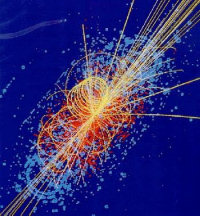- Home
- Science
- Research Groups
- Research Topics
- Annual Report
- Education
- Agenda
- Public & Media

- Contact Us
Institut d'Astrophysique et
de Géophysique (Bât. B5c)
Quartier Agora
Allée du 6 août, 19C
B-4000 Liège 1 (Sart-Tilman)
Belgique
Tel.: 04.366.9779
Fax: 04.366.9729
de Géophysique (Bât. B5c)
Quartier Agora
Allée du 6 août, 19C
B-4000 Liège 1 (Sart-Tilman)
Belgique
Tel.: 04.366.9779
Fax: 04.366.9729
Research Topics
Astroparticles

Many astrophysical observations, coupled with cosmology, provide unique tests of new models in particle physics. Astroparticle physics thus tries to extend the Standard Model to answer the following questions, among others:
- Given the existence of dark matter, and its dominance over ordinary matter, what is the Universe made of ?
- What are the properties of neutrinos, and why is their mass so different from that of other matter particles ?
- Can neutrinos be used instead of light to study "e.g." supernovae ?
- What is the origin of high-energy cosmic rays, and how do they interact with the atmosphere of the Earth ?
- What is the nature of the scalar field which explains the isotropy and homogeneity of the microwave background ?
- Can one build a short-distance description of gravitation, and do gravitational waves exist ?
The IFPA group studies the consequences of existing models (grand unified theories, axions, mirror universe) on astrophysical observables, and considers also the development of new extensions of the Standard Model (two-higgs doublet models) and their cosmological consequences. The group also studies physics related to high-energy colliders (TeVatron, LHC).



 Version française
Version française